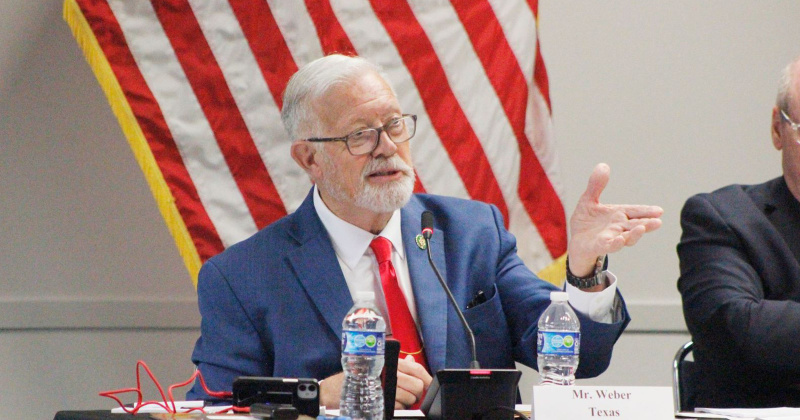More than 120 people gathered for a House Energy Committee field hearing April 8 at Lamar State College Port Arthur (LSCPA), the bi-partisan crowd offering commentary as to the pros – but mostly cons – of the effects of the ban on Southeast Texas.
Serving on a panel exploring “Biden’s LNG Export Ban: How Rush-to-Green Politics Hurts Local Communities and U.S. Energy Security” House Energy Committee members U.S. Reps. Jeff Duncan (R-SC), chair; Randy Weber (R-TX), Morgan Griffith (R-VA) and Lizzie Fletcher (D-TX). Among witnesses addressing the panel were Port Arthur Mayor Thurman Bartie, LSCPA President Dr. Betty J. Reynard, Port of Port Arthur Executive Port Director/ CEO Larry Kelley and Port Arthur Community Action Network (PACAN) executive director John Beard. Collectively, the group addressed the January pause on issuing LNG export permits to nonFree Trade Agreement countries while a review to consider the climate impacts of natural gas is conducted. The administration indicated no end point or timeline for its decision.
Duncan, who represents District 3 in South Carolina, noted that the U.S. is the No. 1 producer and exporter of liquified natural gas (LNG) in the world and reduces emissions more than any other nation.
“We have communities, like the one here in Port Arthur, to thank for this success,” Duncan said, adding that LNG exports strengthen energy security, decrease energy prices here at home, support and create U.S. jobs, and help to lower emissions globally. “U.S. LNG exports could support up to 452,000 additional American jobs and add up to $73 billion to the U.S. economy by 2040. They can also create billions of dollars in revenues for federal, state and local governments.”
The export ban not only cripples the nation, Southeast Texas Rep. Weber indicated, but it also produces hardships for Southeast Texas families, small business owners and students currently studying at the Lamar institutions to pursue a career in the LNG industry, as well as jeopardizes Port Arthur LNG, which broke ground on construction last month.
“When the ban was announced, they were in the process of applying through the permits and approvals process for Phase 2, which is an expansion that would help meet future demand for U.S. LNG supplies for Europe, Asia, and other global markets,” Weber said, a move that is now uncertain.
Fletcher, the lone Democrat on the panel, voiced concerns over the title of the hearing, indicating the word “ban” is a misnomer; it is actually a “temporary pause” on the approval of export permits while the DOE reviews and updates its determinations process.
“Facilities with existing permits will continue to operate and fill orders and includes facilities that are under construction and several that have not begun construction,” she said. “It is not the same thing as a ban on exports.”
“With that said,” Fletcher continued, “I know that the pause has caused concerns and uncertainty for people, for projects, for communities and companies.”
Bartie said he wanted to appeal to the administration to reconsider and subsequently abandon disallowing the permitting process to go forward.
“The pause is for Phase 2 (of the Port Arthur LNG project) and doesn’t involve the current work that’s going on,” Bartie acknowledged, but digressed. “But, for the students educating now and the next 24 months, if this doesn’t change, then it will have an ill effect and the negative impact would be upon us.”
Reynard said the pause has impacted the college, which is located in one of the urban and economically disadvantaged communities in Texas. She stated the per capita income is $24,000, resulting in 27.6% of Port Arthur residents living below the poverty level. And, although the education level obtained by Port Arthur residents falls far behind national trends, Reynard in confident that LSCPA can help “lift individuals out of poverty through education,” as LSCPA offers associate and certificate programs; however, several of the largest programs are related to the manufacturing industry.
“The impact of the LNG industry cannot be understated,” she said. “Construction and expansion of the LNG industry contribute to the local and national economy by creating new jobs and generating revenue through employment opportunities, tax revenue and investments in infrastructure.”
Reynard added that LNG industries support LSCPA with scholarships and that internships averaging more than $16 per hour frequently result in fulltime positions that pay from $64,000 to $109,000 per year, according to the U.S. Bureau of Statistics.
Whether it will mean more jobs for Southeast Texans remains to be seen, but DOE Secretary Jennifer Granholm recently gave hope to an eventual end to the ban/pause, stating, “By this time next year, the pause should be in the rearview mirror.”
“If Secretary Granholm can see now that the pause should be in the rearview mirror by this time next year, one would suspect that Secretary Granholm recognizes that should be in the rearview mirror now,” stated panelist Griffith. “The sooner the better because of the job impact.”
“This pause will give us time, as a nation, to fully understand the full impacts of these projects on communities like mine when the DOE makes its determination on the impacts of LNG on communities,” Beard said. “This has never been done before which is why communities, like Port Arthur, continue to live with such disproportionately unhealthy burdens.”
To view the hearing, visit www. youtube.com/watch?v=MQZz1FdorqE.


